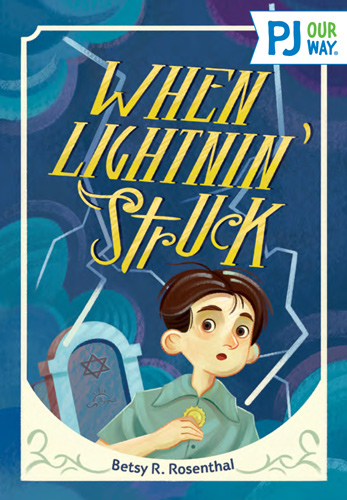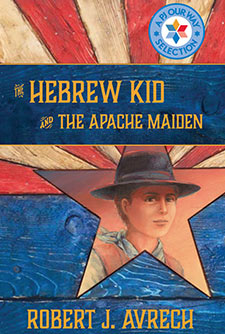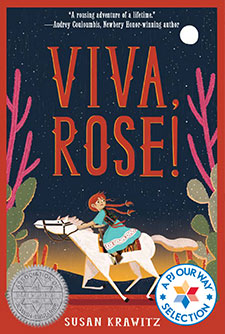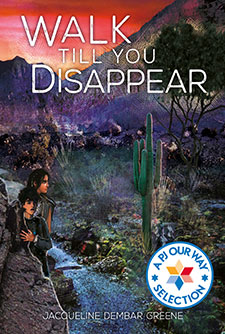When Lightnin' Struck
Odessa, Texas, 1928. With his dad killed by a lightning strike and his mom in jail, no wonder 11-year-old James feels like he’s cursed. But can an old family mystery and a new friend change his luck?
Average Rating
( hint: Login to leave a review! )
57 Reviews
Leave Review
What the Book Is About
Jewish Content & Values
Positive Role Models
Content Advisory
Talk It Over
More for You
What the Book Is About
It’s 1927 in Odessa, Texas. Eleven-year-old James’s dad was killed by a lightning strike when he was little, his mom is in jail, and the local bully, Virgil, taunts him mercilessly. Then his beloved Abuela dies, and she leaves him a mysterious amulet along with her skills as a healer. With the help of his new friend, Paul, who's a Jewish immigrant from Russia, and Paul’s family, James searches for the meaning behind the mystery and starts on the path to his true identity.
- Abuela gives James a mysterious medallion with a menorah engraved on it and Hebrew writing on the back. Her gravestone doesn’t have a cross on it like the others in the cemetery, but hands praying. Her grandfather puts two stones on her grave as per her wishes.
- Paul’s family speaks Yiddish. Paul invites James to dinner for Rosh Hashanah. They dip apples in honey and say the bracha (blessing) before eating it, and they have chicken soup with kreplach for the festive meal. Another time, James goes to Paul’s house, and they invite him in for Shabbat dinner. He witnesses the brachot and rituals before the meal and the grace after meals (birkat hamazon). James goes to Paul’s family for Hanukkah, and they light the menorah, eat latkes, and play dreidel.
- Paul’s family tells James that the shema is written on the back of his medallion and explains its significance. When he gets home, Pappy brings out Abuela’s family bible from Spain and tells him about her Jewish heritage.
- Paul, a Jewish immigrant from Russia, helps protect James from the bully, and he welcomes James into his family when James's mother and grandfather aren’t able to give him the emotional support he needs.
- James questions the views of people in his town who are prejudiced against those who are different. When the boy who bullies him is caught in a storm, James uses his herbal remedy skills to nurse Virgil back to health. James recognizes that a healer has a duty to help anyone in need, even if they’re mean.
- Mama has an unnamed mental health issue. At the start of the story, she's in jail, but she is determined to get the treatment that will help her get well so that she can come home to James. She treats him lovingly at all times despite her struggles. When James tells her about the antisemitic stereotypes he has heard, as well as his friendship with Paul, she tells him not to listen to ignorant people who make up stories about people who are different.
Content Advisory
James’s beloved Abuela gets sick and dies in a short scene early on, and his father is struck by lightning and killed before the start of the book. The bully, Virgil, beats up James, and Virgil’s father drinks and beats up Virgil. James’s mother has mental health issues and is in jail for being violent after drinking. Paul tells James that his family was attacked by the Cossacks in Ukraine. Virgil calls Paul “Christ killer,” and kids and the Reverend repeat antisemitic stereotypes and lies. Pappy explains that the Conversos in Spain who kept secretly Jewish would have been tortured and burned to death if caught.
Talk It Over
When Pappy brings Virgil to their house to recover after the sandstorm, James doesn’t want to use his healing skills to make the bully better, but Pappy insists. If you were James, would you choose to help Virgil? Why or why not?
More for You
Centuries after the Inquisition led Conversos to flee Spain for what would become the American southwest, the Conversos’ descendants, like James in the book, are discovering that they have Jewish heritage. Despite their families practicing Catholicism for hundreds of years, increasing numbers are embracing their identity as Crypto Jews. A 2017 exhibition in Tucson included testimonies about male relatives praying in a “strange” version of Spanish – Ladino – and grandmothers using separate pots and pans to cook meat and milk. Hispanic Sephardim who want to return to Judaism are given help to do so from The Association of Crypto Jews of the Americas, which offers confirmation of a Jewish name and a Ceremony of Return recognized by the State of Israel.
What the Book Is About
What the Book Is About
It’s 1927 in Odessa, Texas. Eleven-year-old James’s dad was killed by a lightning strike when he was little, his mom is in jail, and the local bully, Virgil, taunts him mercilessly. Then his beloved Abuela dies, and she leaves him a mysterious amulet along with her skills as a healer. With the help of his new friend, Paul, who's a Jewish immigrant from Russia, and Paul’s family, James searches for the meaning behind the mystery and starts on the path to his true identity.
Jewish Content & Values
- Abuela gives James a mysterious medallion with a menorah engraved on it and Hebrew writing on the back. Her gravestone doesn’t have a cross on it like the others in the cemetery, but hands praying. Her grandfather puts two stones on her grave as per her wishes.
- Paul’s family speaks Yiddish. Paul invites James to dinner for Rosh Hashanah. They dip apples in honey and say the bracha (blessing) before eating it, and they have chicken soup with kreplach for the festive meal. Another time, James goes to Paul’s house, and they invite him in for Shabbat dinner. He witnesses the brachot and rituals before the meal and the grace after meals (birkat hamazon). James goes to Paul’s family for Hanukkah, and they light the menorah, eat latkes, and play dreidel.
- Paul’s family tells James that the shema is written on the back of his medallion and explains its significance. When he gets home, Pappy brings out Abuela’s family bible from Spain and tells him about her Jewish heritage.
Positive Role Models
- Paul, a Jewish immigrant from Russia, helps protect James from the bully, and he welcomes James into his family when James's mother and grandfather aren’t able to give him the emotional support he needs.
- James questions the views of people in his town who are prejudiced against those who are different. When the boy who bullies him is caught in a storm, James uses his herbal remedy skills to nurse Virgil back to health. James recognizes that a healer has a duty to help anyone in need, even if they’re mean.
- Mama has an unnamed mental health issue. At the start of the story, she's in jail, but she is determined to get the treatment that will help her get well so that she can come home to James. She treats him lovingly at all times despite her struggles. When James tells her about the antisemitic stereotypes he has heard, as well as his friendship with Paul, she tells him not to listen to ignorant people who make up stories about people who are different.
Content Advisory
Content Advisory
James’s beloved Abuela gets sick and dies in a short scene early on, and his father is struck by lightning and killed before the start of the book. The bully, Virgil, beats up James, and Virgil’s father drinks and beats up Virgil. James’s mother has mental health issues and is in jail for being violent after drinking. Paul tells James that his family was attacked by the Cossacks in Ukraine. Virgil calls Paul “Christ killer,” and kids and the Reverend repeat antisemitic stereotypes and lies. Pappy explains that the Conversos in Spain who kept secretly Jewish would have been tortured and burned to death if caught.
Talk It Over
Talk It Over
When Pappy brings Virgil to their house to recover after the sandstorm, James doesn’t want to use his healing skills to make the bully better, but Pappy insists. If you were James, would you choose to help Virgil? Why or why not?
More for You
More for You
Centuries after the Inquisition led Conversos to flee Spain for what would become the American southwest, the Conversos’ descendants, like James in the book, are discovering that they have Jewish heritage. Despite their families practicing Catholicism for hundreds of years, increasing numbers are embracing their identity as Crypto Jews. A 2017 exhibition in Tucson included testimonies about male relatives praying in a “strange” version of Spanish – Ladino – and grandmothers using separate pots and pans to cook meat and milk. Hispanic Sephardim who want to return to Judaism are given help to do so from The Association of Crypto Jews of the Americas, which offers confirmation of a Jewish name and a Ceremony of Return recognized by the State of Israel.




